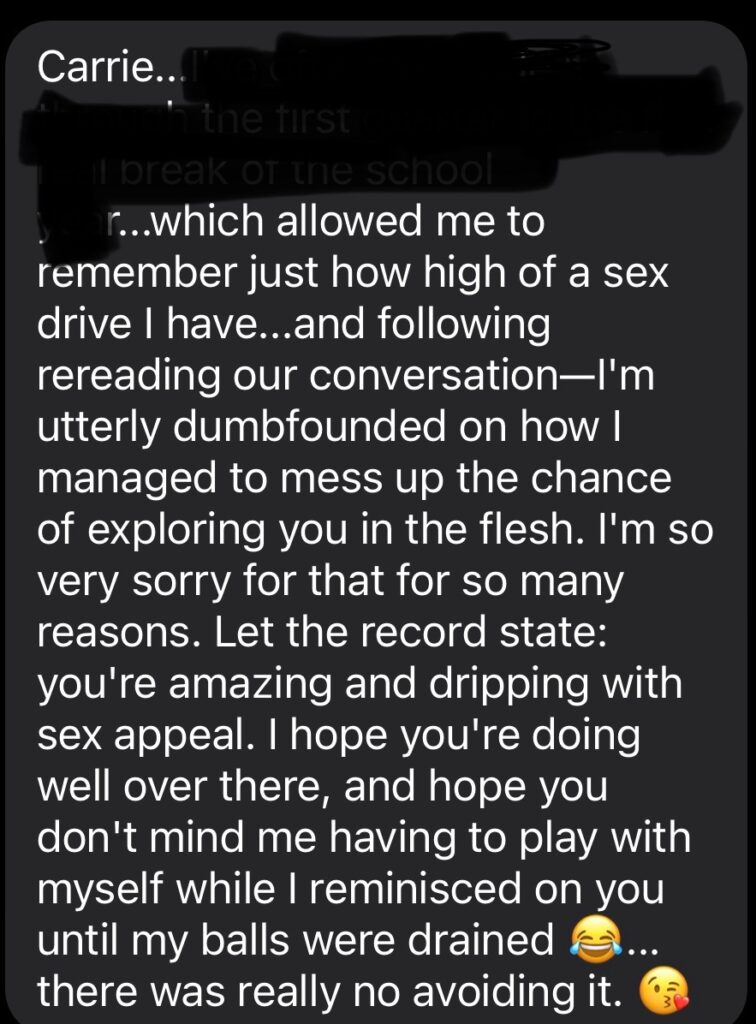Ghosting: A Haunting Proposition
October 13, 2024

Disclaimer: This post may not be suitable for certain audiences, including my parents, former spouse, and anyone offended by graphic text messages.
Dating apps were supposed to revolutionize the way we meet people, right? Swipe right, match, chat about dreams, feel a spark, and boom—you’re off to sip overpriced cocktails while pretending their new tattoo is “super cool.” But in reality, dating apps have cultivated some pretty bad behavior. I have not been immune to the dreaded ghosting, a disappearing act that would make Houdini proud.
I’ve been ghosted three times in my dating journey. And I’ll admit, it’s been confusing and humiliating each time. What’s worse? They always come back for more. But more on that later…
So, why do people ghost? What do they get out of it? Let’s break it down.
The “I Got What I Wanted” Ghost
Let’s be honest, some ghosts are just in it for a quick fling. Once they feel they’ve gotten what they came for—whether it’s attention, validation, or something else—they vanish without a trace. No closure, no explanation, just radio silence. It’s selfish and shallow, but it’s probably the most common type of ghosting.
For better or worse, I’m open about my books on my dating apps, and that often sparks conversations about romance writing. Sometimes (and I’m being vulnerable here), those conversations turn sexual. Yes, I know better, but here we are.
In one particular ghosting experience—we’ll call him Casper—we had a date set (complete with a time and location) and we’d even FaceTimed. The conversation was great; we talked about shared interests, and, yes, it turned sexual at times. But then Casper stopped responding, and I knew he wouldn’t show up to the date. He resurfaced recently with a vile message out-of-the blue (complete with a video of his self-described draining activity):

I responded, letting him know that what he did was unkind (among a few other choice words), and then blocked him.
Does engaging in consensual sexting mean that I—or anyone—deserves bad behavior? Absolutely not. And it says a lot more about the ghoster’s character than yours.
The Commitment-Phobic Ghost
This guy swipes right with the enthusiasm of someone diving headfirst into a bag of chips. But when the conversation starts feeling too real (i.e., you’ve exchanged more than three messages), he freaks out. Did you ask how his day was? Or mention a potential weekend plan? WHOA THERE. That’s practically marriage in his world. Instead of saying, “Hey, I’m not ready for this,” he pulls a Houdini. Poof—gone!
Here’s the thing: his disappearance isn’t because you sent that one questionable meme (we’ve all been there). The truth is, the idea of commitment makes him sweat like he’s trapped in a sauna. He’d rather retreat to the safety of Netflix than confront the fact that real relationships require real effort.
It’s not you; it’s definitely him.
The “Too Many Options” Ghost
You know that buffet where your eyes are bigger than your stomach? That’s dating apps for some people. Swipe, swipe, swipe. This guy is overwhelmed by the sheer volume of potential matches at his fingertips. You seem great, but then—oh no—he matches with someone who shares his exact obscure taste in movies. Now he’s off to chase that shiny new match, leaving you to wonder if your “Hi, how’s your day?” was just too vanilla.
This type of ghosting has nothing to do with you and everything to do with his inability to focus on one person at a time. He’s like a toddler in a toy store—constantly distracted by the next flashy thing that comes along.
The Overwhelmed Ghost
This ghost is just plain exhausted. After a week of swiping, chatting, and trying to be charming, he realizes that dating is basically a part-time job, and he’s not sure he’s ready to be employed. He probably had every intention of continuing the conversation, but suddenly, it feels like too much. So, he does what any “responsible” adult would do: he fades into the digital ether rather than, you know, using his words. Ghosting is easier than typing an honest explanation.
Final Thoughts: Don’t Let the Ghost Haunt You
Disappearing on someone without an explanation isn’t just a dating faux pas: it’s inconsiderate, cowardly, and flat-out rude. Sure, dating can be overwhelming and awkward, but it’s also an experience that involves real humans with real feelings (even if it’s just for a short time). Ghosting leaves people second-guessing, questioning what they did wrong, or worse, wondering if they’re even worth a simple goodbye. It takes all of 30 seconds to type out: “Hey, I’m not feeling a connection, but I wish you the best!”
Easy, right? So why don’t more people do it? Because ghosting lets them off the hook. It’s a way of avoiding uncomfortable conversations, but it also deprives both people of closure. And if they can’t even say, “Sorry, this isn’t working,” they they’re not ready for the mature, healthy relationship they claim to want.
I know it’s easier said than done, but remember: ghosting reflects emotional immaturity, not your worth. It’s frustrating and hurtful, but in the end, you’re better off without someone who can’t be bothered to show you basic decency. Block, delete, and move on. Because there’s no point in chasing a ghost.